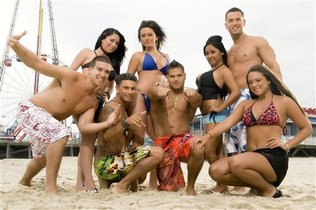
The reactions started immediately. I have to admit, my own gut couldn’t hold back its own impulsive repulsion to possibly the newest addition to the quality MTV programing that graces our screens across the globe. Hot on the heels of the announcement came the angry, sarcastic, concerned, ridiculing, responses from Iranian Americans. I secretly felt quite proud. But apart from the obvious low-brow -ness of the whole thing, is there a more precise reason why the Persian Version strikes such as sensitive chord with us?
I’m still not sure, but if my Facebook feed is any indication, nobody’s excited about it… at all. One LA Iranian publicity magnate became a fan of the Boycott page against the show before it is even made, saying her objection was based on Iranian Americans being a relatively new ethnicity in the US and at this stage needing better representation than a show like this “Jersey Shore” spin-off, which exploits the negative aspects of a stereotype. And, yeah, pretty much everyone else I know was repulsed to varying degrees.
So who are the people who would not only be excited by the prospect of the show being made, but also more than willing to participate in it? Personally, I’m familiar with this type only through legend. I was never able to access the life of this much-talked-about Persian American club-scene-enthusiast since I’ve never come across anyone willing to own that label let alone boast it with pride (as the show demands). Despite his/her illusiveness (at least to me) this typical “Persian Version” individual plays a big part in the responses of those with whom I did speak.
Across the board and unequivocally, my respondents assert that these shallow, club scene creatures create a harmful image of Iranian Americans in LA, one from which others take distance and with which they don’t want to be associated. Some express their aversion much more strongly – I won’t use their language. I would guess this show and the group it seeks to showcase uncover a sore spot amongst Iranian Americans because of the wider issues among Iranians in LA and the culture of consumerism and material wealth they have come to embody.
Views on Privilege
Some young second generation women I spoke to (a couple of which are active community organizers) considered the readily visible wealth and privilege of LA Iranians to be an obstacle standing square in the way of united struggle for equal rights and recognition in the US. According to them, portraying Iranian Americans’ wealth as their main strength excludes the many lower/middle- and working-class Iranians in America today (not to mention the many in Iran) and therefore undermines notions of “community” by simultaneously capitalizing on and denying the economic inequalities among us.
On the other hand, the idea of wealth as a central Iranian American strength is embraced by some large Iranian American organizations, important public figures in the community, and individuals in general. After all someone thought the Persian Version of the Jersey Shore was a sign that “we have arrived” as a legitimate ethnic group in America. The tension between the accumulation of individual wealth/status on the one hand and the spirit of volunteerism and community-building on the other is nothing new within Iranian American diaspora – it’s an old plague. But it seems today’s generation is the first to be dealing with it head-on by thinking critically and being on top of things when it comes to the ways Iranians are represented to the public eye. And I see how this is an important role for all of us to play.
The Media Dream
But what about the responsibility of a media and a society that promotes the acceptance of a diversity of cultures into the mainstream by including them in the lowest common denominator-kind of entertainment. Doesn’t this implicate a media culture that rewards recklessly materialistic behavior because it has proven to embrace the “American Dream?” The Persian Version is something of a grotesque extreme in this sense, but the idea of Iranian Americans being incorporated into American society because of their power as consumers, financial backers, and entrepreneurs seems to be prevalent today among LA Iranians and is used as a way to mobilize the second generation, too. It betrays close parallels to Hamid Naficy’s analysis of the first generation’s embrace of blatant consumerism as a way to fit in to American society as newcomers in the late 70s and into the early 80s in his well-known book and article on LA Iranians and satellite television.
The difference, I suppose, is that while there have almost always been complaints about how others portray us, today those who call attention to the issue of wealth as an obstacle to community-building also reveal the problems with how we represent ourselves (as particularly wealthy members of American society). They attempt to avoid misrepresentation by avoiding self-misrepresentation. And I’ve seen how young Iranian Americans take (self)-representation seriously in increasingly sophisticated ways in online and offline public media today. But that probably won’t change the fact we live in a media society that tends toward content like “Jersey Shore,” regardless of what Iranians do. The question is then, are we to beat them or joint them?






